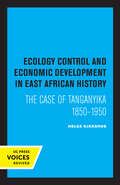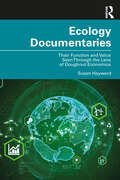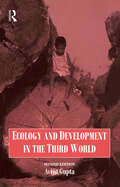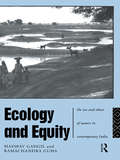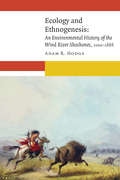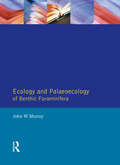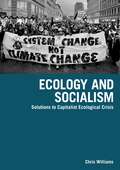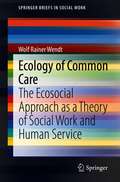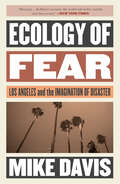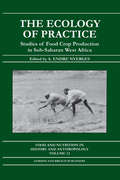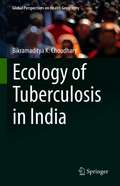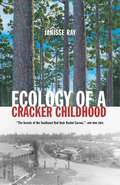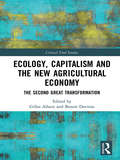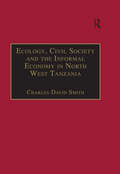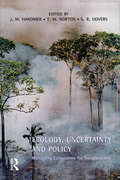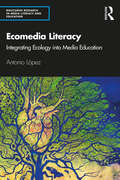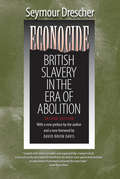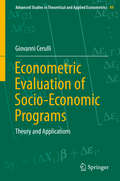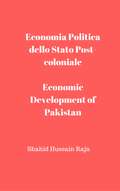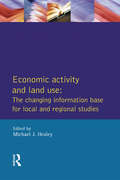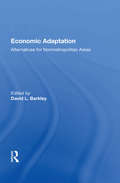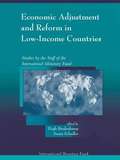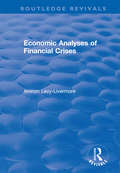- Table View
- List View
Ecology Control and Economic Development in East African History: The Case of Tanganyika 1850–1950 (Eastern African Studies)
by Helge KjekshusThis title is part of UC Press's Voices Revived program, which commemorates University of California Press’s mission to seek out and cultivate the brightest minds and give them voice, reach, and impact. Drawing on a backlist dating to 1893, Voices Revived makes high-quality, peer-reviewed scholarship accessible once again using print-on-demand technology. This title was originally published in 1977.
Ecology Documentaries: Their Function and Value Seen Through the Lens of Doughnut Economics
by Susan HaywardThis companion piece to Susan Hayward’s Film Ecology focuses on ecology documentaries produced in the first 20 years of the new millennium (2000–19). Using Kate Raworth’s regenerative economic theoretical model as set out in Doughnut Economics, this book examines 57 films emanating from Europe and the 4 areas of concern they raise about energy production, pollution and waste management, agribusiness, disrupted ecosystems and the migratory f low. These ecology documentaries make explicit the damage done to our planet thanks to growth capitalism and neoliberal globalisation. But they also provide the evidence that solutions to this planetary abuse exist. The book demonstrates how these documentaries reveal the process of humankind’s planetary plundering and explores the structuring of the eco-doc as a new generic type in the domain of documentary practice. Using Raworth’s model allows us to measure the tentacular extent of the planetary harm growth economics induces and, too, by way of contrast, perceive how regenerative economics can work to redress this harm, heal the Earth and make it a safe place for humanity. This book is ideal for film studies scholars and students, including those teaching or studying film practice, documentary film, European cinema and environmental studies, as well as economists interested in regenerative economic models. It also has general appeal to all who are concerned about some of the major causes of planetary degradation and its impact on humanity and Earth.
Ecology and Development in the Third World (Routledge Introductions To Development Ser.)
by Avijit Gupta A. GuptaThis comprehensive second edition provides an up-to-date introduction to the nature of ecological degradation in a world of dramatic environmental change.
Ecology and Equity: The Use and Abuse of Nature in Contemporary India (Oxford India Paperbacks Ser.)
by Ramachandra Guha Madhav GadgilEnvironmental destruction is seen a matter of worldwide concern but as a Third World problem. Ecology and Equity explores the most ecologically complex country in the world. India's peoples range from technocrats to hunter-gathers and its environments from dense forest to wasteland. The bookanalyses the use and abuse of nature on the sub-continent to reveal the interconnections of social and environmental conflict on the global scale. The authors argue that the root of this conflict is competition within different social groups and between different economic interests for natural resources. Radical both in its critique of the causes of crisis in India and in its proposals for ecological reform, Ecology and Equity is essential reading for all concerned for the Third World's in the world.
Ecology and Ethnogenesis: An Environmental History of the Wind River Shoshones, 1000–1868 (New Visions in Native American and Indigenous Studies)
by Adam R. HodgeIn Ecology and Ethnogenesis Adam R. Hodge argues that the Eastern Shoshone tribe, now located on the Wind River Reservation in Wyoming, underwent a process of ethnogenesis through cultural attachment to its physical environment that proved integral to its survival and existence. He explores the intersection of environmental, indigenous, and gender history to illuminate the historic roots of the Eastern Shoshone bands that inhabited the intermountain West during the nineteenth century. Hodge presents an impressive longue durée narrative of Eastern Shoshone history from roughly 1000 CE to 1868, analyzing the major developments that influenced Shoshone culture and identity. Geographically spanning the Great Basin, Rocky Mountain, Columbia Plateau, and Great Plains regions, Ecology and Ethnogenesis engages environmental history to explore the synergistic relationship between the subsistence methods of indigenous people and the lands that they inhabited prior to the reservation era. In examining that history, Hodge treats Shoshones, other Native peoples, and Euroamericans as agents who, through their use of the environment, were major components of much broader ecosystems. The story of the Eastern Shoshones over eight hundred years is an epic story of ecological transformation, human agency, and cultural adaptation.Ecology and Ethnogenesis is a major contribution to environmental history, ethnohistory, and Native American history. It explores Eastern Shoshone ethnogenesis based on interdisciplinary research in history, archaeology, anthropology, and the natural sciences in devoting more attention to the dynamic and often traumatic history of “precontact” Native America and to how the deeper past profoundly influenced the “postcontact” era.
Ecology and Palaeoecology of Benthic Foraminifera
by John W. MurrayThis is an important and authoritative review of foraminiferal ecology, the first for over a decade. Professor Murray relates ecological data on living forms of foraminifera to the palaeoecology of fossil species, and defines in detail areas of global distribution.
Ecology and Socialism
by Chris WilliamsAround the world, consciousness of the threat to our environment is growing. The majority of solutions on offer, from using efficient light bulbs to biking to work, focus on individual lifestyle changes, yet the scale of the crisis requires far deeper adjustments. Ecology and Socialism argues that time still remains to save humanity and the planet, but only by building social movements for environmental justice that can demand qualitative changes in our economy, workplaces, and infrastructure.Chris Williams is a longtime environmental activist, professor of physics and chemistry at Pace University, and chair of the science department at Packer Collegiate Institute. He lives in New York City.
Ecology of Common Care: The Ecosocial Approach as a Theory of Social Work and Human Service (SpringerBriefs in Social Work)
by Wolf Rainer WendtThis book offers an ecological foundation for social work and for care provision in general. It presents the ecosocial approach according to its origins, distinguishing it from other theoretical social work approaches and applying it to various areas of care for welfare. The ecological anchoring of social welfare and common care is an emerging topic in political, organisational, and person-related development of human services and social work. In an era of crisis, this anchoring is an essential contribution to the study of sustainable social provision. The book embeds the dispositions about it in the ecology of the protection and securing of common life. Ecology of Common Care: The Ecosocial Approach as a Theory of Social Work and Human Service is an essential text that should engage the academic community of educators and researchers in social work and other human services professions, as well as students in bachelor's and master's programmes in these professions.
Ecology of Fear: Los Angeles and the Imagination of Disaster
by Mike DavisA witty and engrossing look at Los Angeles' urban ecology and the city's place in America's cultural fantasiesEarthquakes. Wildfires. Floods. Drought. Tornadoes. Snakes in the sea, mountain lions, and a plague of bees. In this controversial tour de force of scholarship, unsparing vision, and inspired writing, Mike Davis, the author of City of Quartz, revisits Los Angeles as a Book of the Apocalypse theme park. By brilliantly juxtaposing L.A.'s fragile natural ecology with its disastrous environmental and social history, he compellingly shows a city deliberately put in harm's way by land developers, builders, and politicians, even as the incalculable toll of inevitable future catastrophe continues to accumulate.Counterpointing L.A.'s central role in America's fantasy life--the city has been destroyed no less than 138 times in novels and films since 1909--with its wanton denial of its own real history, Davis creates a revelatory kaleidoscope of American fact, imagery, and sensibility. Drawing upon a vast array of sources, Ecology of Fear meticulously captures the nation's violent malaise and desperate social unease at the millennial end of "the American century." With savagely entertaining wit and compassionate rage, this book conducts a devastating reconnaissance of our all-too-likely urban future.
Ecology of Practice
by NyergesFirst Published in 1998. Routledge is an imprint of Taylor & Francis, an informa company.
Ecology of Tuberculosis in India (Global Perspectives on Health Geography)
by Bikramaditya K. ChoudharyThe book addresses the issue of disease diffusion across the geographical span of India during the colonial period. Based on archival records, it analyses colonial economic policies and their implications for the spread of the disease across different regions of India as well as the role of the military in disease spread. It adds a new dimension to the understanding of the spread of TB in colonial India.The book also discusses the concept of the meaning of illness for different cohorts of TB patients. Based on narratives, it brings to readers the social and cultural dimensions that are responsible for the prevalence of the disease, despite having vaccination and medication available for more than half a century.The book will be beneficial to health and medical geographers and will bring new insights in historical geography as well as the history of medicine, by incorporating policy changes and their implication in disease spread. Sociologists and public health professionals will find narratives of patients interesting and useful for furthering their understanding.
Ecology of a Cracker Childhood
by Janisse Ray"A tellingly honest tale of a girl who has grown up, against all odds, to become not only a lover of nature, but a spokeswoman for her place of origin and her 'Cracker' kin." -Thomas Rain Crowe, Rain Taxi "Every page of her book is equally vivid, whether she's describing the South Georgia junkyard where she grew up or the longleaf pine forests of today." -Sharon Rauch, Tallahassee Democrat "Janisse Ray knows that her region's story and her own story are insepa- rable; in many ways they are the same story. To tell that story as well as she tells it here is at once to show what has gone wrong and to light the way ahead. This book, clearly, is only a beginning. It is well done and is very moving." -Wendell Berry "A hauntingly beautiful work that explores the themes of loss and the redemption to be had through connection to family, culture and na- ture. Seamlessly weaving memories of her poverty-stricken childhood with musings about the destruction of die longleaf pine forests that once blanketed Georgia, Ray creates a tapestry of the landscape she carries 'inside like an ache.' She deftly spins the connections, offering what she has learned: That her personal story is inseparable from the story of her land." - Charleston Post and Courier
Ecology, Capitalism and the New Agricultural Economy: The Second Great Transformation (Critical Food Studies)
by Gilles Allaire Benoit DavironWith increasing pressure on resources, the looming spectre of climate change and growing anxiety among eaters, ecology and food are at the heart of the political debates surrounding agriculture and diet. This unique contribution unravels agri-environmental issues at different spatial levels, from local to global, documenting the major shifts in agriculture from a long-term perspective. The book begins by exploring the changes in the industrialisation and socialisation of agriculture over time, through the lens of institutional economics including The French Regulation School and Conventions Theory. Building on Polanyi’s ‘Great Transformation’, the chapters in this volume analyse long-term and contemporary changes in agriculture and food systems that have occurred throughout the last few centuries. Key chapters focus on the historical changes in provisioning and the social relations of production, consumption, and regulation of food in different socio-political contexts. The future of agriculture is addressed through an analysis of controversial contemporary political claims and their engagement with strategies that aim to improve the sustainability of agriculture and food consumption. To shed light on ongoing changes and the future of food, this book asks important environmental and social questions and analyses how industrial agriculture has played out in various contexts. It is recommended supplementary reading for postgraduates and researchers in agricultural studies, food studies, food policy, the agri-food political economy and political and economic geography.
Ecology, Civil Society and the Informal Economy in North West Tanzania (The Making of Modern Africa)
by Charles David SmithBased on a decade of first-hand experience and secondary research, this richly detailed study follows daily life in four villages in Tanzania. Funded by the Social Sciences and Humanities Research Council, this comprehensive account examines the regional economy, determinants of civil society and implications for democratization, AIDS, population growth, refugees, crops and goods and implications for development. Charles David Smith brings together well over 200 interviews and his own experience of everyday events, providing a constructive critique of current initiatives and a potent new direction that has so far been under-explored by existing bodies. An essential text for all serious students and researchers interested in development.
Ecology, Uncertainty and Policy: Managing Ecosystems for Sustainability
by John HandmerA broad and comprehensive exploration of the role of the ecological sciences in sustainability for undergraduates.The urgent quest for more sustainable patterns of development has placed new and difficult demands on both scientists and policy makers as they seek to establish more informed and effective policy processes and management regimes in the the face of pervasive uncertainty. Written by an international group of authors from a range of disciplines - ecology, geography, law, policy analysis and others - the chapters explore issues of scientific legitimacy, public participation, non-governmental organisations, inter-sectoral communication and pragmatic public policy across a wide range of ecosystem management contexts.
Ecomedia Literacy: Integrating Ecology into Media Education (Routledge Research in Media Literacy and Education)
by Antonio LopezThis book offers a focused and practical guide to integrating the relationship between media and the environment—ecomedia—into media education. It enables media teachers to "green" their pedagogy by providing essential tools and approaches that can be applied in the classroom. Media are essential features of our planetary ecosystem emergency, contributing to both the problem of and solution to climate chaos, biodiversity loss, ocean acidification, deforestation, water contamination, and so on. Offering a clear theoretical framework and suggested curriculum guide, the book provides key resources that will enable media educators to apply ecomedia concepts to their curricula. By reconceptualizing media education, this book connects ecology, environmental communication, ecomedia studies, environmental humanities, and ecoliteracy to bridge media literacy and education for sustainability. Ecomedia Literacy is an essential read for educators and scholars in the areas of media literacy, media and communication, media and cultural studies, environmental humanities, and environmental studies.
Econocide British Slavery in the Era of Abolition
by Seymour DrescherIn this classic analysis and refutation of Eric Williams's 1944 thesis, Seymour Drescher argues that Britain's abolition of the slave trade in 1807 resulted not from the diminishing value of slavery for Great Britain but instead from the British public's mobilization against the slave trade, which forced London to commit what Drescher terms "econocide. " This action, he argues, was detrimental to Britain's economic interests at a time when British slavery was actually at the height of its potential. Originally published in 1977, Drescher's work was instrumental in undermining the economic determinist interpretation of abolitionism that had dominated historical discourse for decades following World War II. For this second edition, which includes a foreword by David Brion Davis, Drescher has written a new preface, reflecting on the historiography of the British slave trade since this book's original publication.
Econometric Evaluation of Socio-Economic Programs
by Giovanni CerulliThis book provides advanced theoretical and applied tools for the implementation of modern micro-econometric techniques in evidence-based program evaluation for the social sciences. The author presents a comprehensive toolbox for designing rigorous and effective ex-post program evaluation using the statistical software package Stata. For each method, a statistical presentation is developed, followed by a practical estimation of the treatment effects. By using both real and simulated data, readers will become familiar with evaluation techniques, such as regression-adjustment, matching, difference-in-differences, instrumental-variables and regression-discontinuity-design and are given practical guidelines for selecting and applying suitable methods for specific policy contexts.
Economia Politica dello Stato Post-coloniale
by Shahid Hussain Raja Sara PoddaIl libro ripercorre le tappe dello sviluppo economico del Pakistan, dall'indipendenza dal colonialismo britannico, nel 1947, ai tempi nostri, analizzando gli effetti positivi e negativi delle riforme economiche messe in atto da ciascun governo nel corso dei decenni successivi alla creazione di uno stato-nazione.
Economia Política de um Estado Pós-Colonial: History of Economic Development of Pakistan 1947-2018
by Shahid Hussain Raja Omar Hayat RajaDescrição do livro: Apesar de todos os altos e baixos, o Paquistão é agora a 26ª maior economia do mundo em termos de Paridade de Poder de Compra, (44ª maior em termos de PIB nominal). Com uma renda per capita de US$ 4550, o Paquistão ocupa o 140º lugar nesta contagem no mundo, graças à sua crescente população de 200 milhões de pessoas. O Paquistão é um dos Onze Próximos, os onze países que, juntamente com os BRICs, têm potencial para se tornar uma das maiores economias do mundo no século 21. Até 2050, com um PIB estimado em US$ 3,33 triliões, espera-se que o Paquistão se torne a 18ª maior economia do mundo, segundo a Goldman Sachs. No entanto, esse progresso não é tão impressionante quanto parece ou deveria ter mantido o seu potencial. Da mesma forma, os seus indicadores sociais sombrios, anomalias estruturais e disparidades de renda deixam muito a desejar. Este livro é tudo sobre essas tentativas e reviravoltas, fracassos e conquistas e assim por diante. Este volume resume a experiência de desenvolvimento - o que o Paquistão fez maravilhosamente, o que fez marginalmente e onde falhou miseravelmente durante sua jornada de desenvolvimento. Ela termina com uma análise dos factores responsáveis pelo desmembramento do Paquistão pré-1971 e das lições que outros países em desenvolvimento podem aprender com este episódio traumático da história do Paquistão.
Economic Activity and Land Use The Changing Information Base for Localand Regional Studies
by Michael J. HealeyConcerned primarily with statistical data, this text aims to provide a guide to the nature, uses, availability and limitations of the main data sources for interpreting and undertaking regional studies of economic activity. It also considers the methods used for the collection of this data.
Economic Adaptation: Alternatives For Nonmetropolitan Areas
by David L BarkleyThis volume focuses on alternatives for non-metropolitan economic development in the new international economic climate. It provides critical reviews of popular employment-generation alternatives for rural areas.
Economic Adjustment and Reform in Low-Income Countries
by Susan Schadler Hugh BredenkampEconomic Adjustment and Reform in Low-Income Countries. Includes bibliographical references.
Economic Adjustment in Low-Income Countries
by David O. Robinson Susan Schadler Franek Rozwadowski Siddharth Tiwari#Includes bibliographical references (p. ).
Economic Analyses of Financial Crises (Routledge Revivals)
by Amnon Levy-LivermorePublished in 1995, this set of 13 essays on the causes and implications of financial problems in three different economic organizations - corporate, semi-co-operative and non-co-operative farming communities and sovereign states. Areas covered include insolvency and bankruptcy, and risk-sharing/spreading behaviour.
